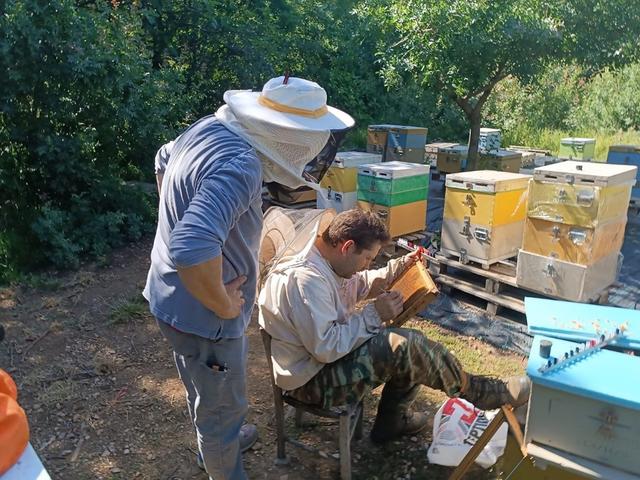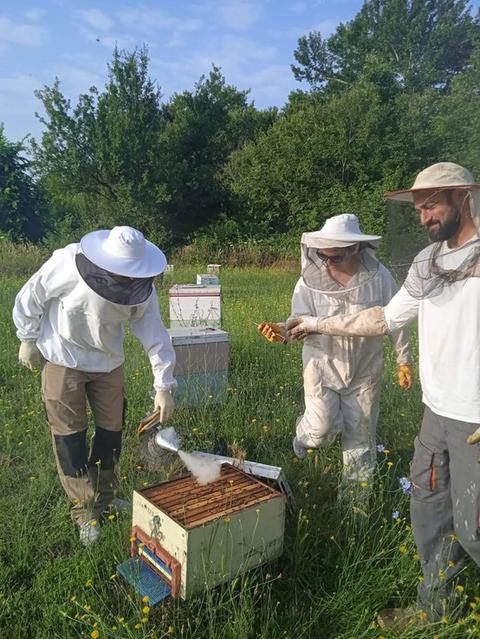Adapting to Cyclones and Wildfires in Greece: Resilient Bee Populations for Food Security
2024 LOCAL ADAPTATION CHAMPIONS AWARD NOMINEE
Natural disasters such as cyclones and wildfires are becoming more common and more severe due to human-induced climate change. Communities of beekeepers in Greece, where bees are critical for food security, are learning how to adapt to these natural disasters by making bee populations more resilient and faster recovering.
Evia, a major honey-producing island in Greece, was devastated by wildfires in August 2021, which destroyed critical habitats for bees. Meanwhile, the Thessaly region suffered severe flooding in September 2023 from Cyclone Daniel, submerging farmland and wiping out crops and beehives. For these areas, bees play a crucial role in agricultural productivity, as they are essential pollinators for crops. The loss of bees not only impacts food production but also threatens the livelihoods of local communities.
Climate-Smart Solutions for Local Communities
The Queen Rearing Program from the New Agriculture New Generation (NANG) NGO, focuses on equipping local beekeepers in Thessaly and Evia with the skills required to maintain healthy bee colonies in today’s climate. Local beekeepers undergo comprehensive training on how to adapt to changing climatic conditions, for example through practices that genetically strengthen their colonies, minimize the use of harmful agrochemicals and that manage disease outbreaks effectively.

Initially, NANG conducted a needs assessment with scientific experts and local professionals to identify key challenges for beekeepers. This shaped the program’s objectives and strategies to address the context specific issues local beekeepers faced. The organization also maintained ongoing discussions with government bodies to align with national agricultural policies and disaster recovery plans and complement state efforts.
NANG uses the “train the trainers” method to train young local beekeepers to become professional “grafters”. The grafters are tasked to train new beekeepers in their region to apply the innovative genetic optimization method of grafting: from chosen endemic beehives, larva is removed from worker cells and transferred into artificial queen cells, producing genetically enhanced queen bees that are best suited to local conditions. This makes the bees more resistant to disease and better adapted to changing climates. This is crucial for strengthening the beekeeping sector and its pollination services, boosting agricultural productivity and contributing to food security.
Local beekeepers are completely integrated into the program: they are engaged in the development and execution, ensuring that their insights and needs are prioritized. By training local beekeepers and providing ongoing support, the project builds local capacity to manage and sustain beekeeping.
“The resilience of farmers and beekeepers has been extraordinary,” says Archonto Antonatu, Fundraising Manager at New Agriculture New Generation. “But they need the tools to adapt. Our program strengthens bee populations while training beekeepers in sustainable practices that will benefit them long term.”

Responding to Natural Disasters
In Thessaly, where Cyclone Daniel devastated the beekeeping sector, New Agriculture New Generation’s efforts have been critical. More than 40% of the region’s beehives were lost. Through the Queen Rearing Program, over 300 beekeepers received 26,500 enhanced queen cells, replenishing their bee colonies and helping restore agricultural productivity. The beekeepers were also supported with new knowledge and skills to help them be better prepared to face challenges, to adapt to climate change and to take the necessary measures for the proper management of their bees.
Professional grafter Stamou Periklis said, “I had the pleasure of working with an outstanding team of breeders under the guidance of the Agricultural University of Athens, providing 27,000 royal bee cells to beekeepers of Thessaly. Our cooperation was exemplary, with each team member contributing their expertise and devotion. Beekeepers who received our royal cells were delighted with the quality. Many of them expressed their gratitude for our effort and work. The satisfaction and positive comments of beekeepers is the greatest reward for our effort. I am proud to have been a part of this effort and I look forward to future collaborations.”

Scaling Up and Moving Forward
Since the inception of New Agriculture New Generation, the primary goal has been the creation of employment and entrepreneurship opportunities for youth in the Agrifood Sector in Greece and the complete revitalization of the beekeeping sector.
The success of the program in Evia and Thessaly has generated interest in scaling it up. “By fostering sustainable beekeeping practices, improving bee genetics, and enhancing local economies, NANG has set a benchmark for innovative agricultural initiatives that can be replicated in other regions facing similar challenges.” says Archonto Antonatu.